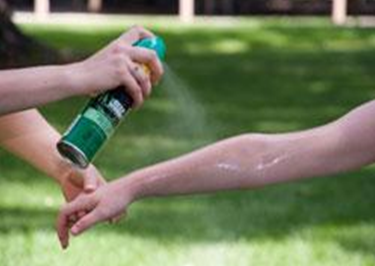Preventing Bug Bites. By Our Student Pharmacist, Cambree Fillis.
As the weather gets nicer, everyone enjoys spending more time outdoors–but, so do the bugs! It is important to be mindful of bug bites and their consequences. Bug bites can result in the spread of various diseases including dengue, chikungunya, malaria, Zika, yellow fever, Japanese or tick-borne encephalitis, Lyme disease, and more.
Some of the diseases that are transmitted by bugs can be prevented in several ways. Prophylactic medications and vaccinations are available in some cases. Be sure to talk with your doctor and/or check out the Center for Disease Control and Prevention’s (CDC) website for traveler’s information and specific health risks prior to any extensive travel this summer.
Additionally, staying informed on the prime times for bug bites can prevent illnesses. For instance, mosquito season begins at the start of summer and persists until autumn. Most mosquitoes tend to bite more often during the daytime; however, those carrying Malaria and West Nile are more active after dark, between dawn and dusk. Ticks, on the other hand, may be active during all times in grassy areas and woodlands. Be sure to check for ticks regularly if you spend time outdoors and remove them immediately if spotted.
The best way to remove ticks from pets, children, and yourself includes using a tweezer to grasp the tick as close to the skin’s surface as possible. With even pressure, pull the tick upward. Do not twist. Once the tick is removed, the area should be cleaned with rubbing alcohol or soap and water. The tick should be disposed of in a sealed bag or container, submerged alcohol, or flushed.
Here is an excellent article from the CDC about ticks, tick bites, what various ticks look like, and their removal. Click HERE to view it.
Additional preventative measures to avoid bug bites include keeping homes and businesses air conditioned. Also, empty and clean out anything that holds water at least once a week. If you are traveling and air conditioned sleeping spaces are not available, be sure to sleep with a bed net and stay covered up at all times. Long sleeve shirts should be tucked in to long pants and long pants should be tucked in to socks. Boots are also recommended as opposed to open-toed shoes.
Lastly, bug repellents can be used to lessen the risk of illnesses by deterring bugs from biting. The Environmental Protection Agency (EPA) regulates the safe and effective use of bug repellents in the United States.
As approved by the EPA, permethrin, although it should never be applied directly to the skin, can be used to wash and pretreat tents, sleeping bags, and clothing.
Other repellents are approved with the following active ingredients:
- DEET
- picaridin
- oil of lemon eucalyptus
- IR3535
- para-menthane-diol
- 2-undecanone
Each of these ingredients may be applied directly to exposed skin. They should not be applied to skin that is covered by clothing.
Please note that other products may be marketed as bug repellents, but if they do not contain the aforementioned active ingredients, they have not yet been approved by the EPA. The safety and effectiveness of those products are unknown. Approved repellents should be applied and reapplied as directed on the label. They should be used with caution as to avoid accidental ingestion. When applying to your face, spray repellent on your hands first and then rub gently onto your face, avoiding your mouth and eyes. Be sure to avoid applying repellents in areas with an open cut, wound, or irritated skin, as well.
When using insect repellents, the higher the concentration of active ingredients, the longer the duration of protection. For this reason, it is recommended to use at least 20% DEET to prevent mosquito and tick bites. However, in the case of DEET, there is thought to be minimal difference in the extent of protection as concentrations exceed 50%. Additionally, the effectiveness of all products may vary depending on temperature, extent and type of activity you are completing, as well as if you are sweating while doing it.
Additional tips when using insect repellents include to:
- Wash your hands after every application.
- Rinse thoroughly with soap and water once returning back indoors.
- Avoid use in children less than two months old, unless using oil of lemon eucalyptus or para-menthane-diol. These should not be used in children younger than three years old.
- Avoid use of DEET concentrations greater than 30% in children.
- Apply sunscreen first, let it dry completely, and then apply repellent.
- You may need to apply sunscreen more frequently if using with a product containing DEET as studies have shown a decrease in sun protection factor (SPF) when combining these products.
Two natural products that we can order and have for you and that we recommend are:
Resources:
- Bonner L. Given CDC report, make sure patients know how to prevent insect bites. Published July 2018. Accessed April 2019. https://www.pharmacytoday.org/article/S1042-0991(18)30931-9/fulltext.
- Centers for Disease Control and Prevention (CDC). Avoiding Bug Bites. Updated March 2019. Accessed April 2019. https://wwwnc.cdc.gov/travel/page/avoid-bug-bites.
- Centers for Disease Control and Prevention (CDC). Mosquito Bite Prevention. Published October 2018. Accessed April 2019. https://www.cdc.gov/chikungunya/pdfs/fs_mosquito_bite_prevention_us.pdf.
- Mutebi JP, Hawley WA, Brogdon WG. Protection against Mosquitoes, Ticks, & Other Arthropods. Accessed April 2019.
- United States Environmental Protection Agency. Find the Repellent that is Right for You. Updated June 2017. Accessed April 2019. https://www.epa.gov/insect-repellents/find-repellent-right-you.



